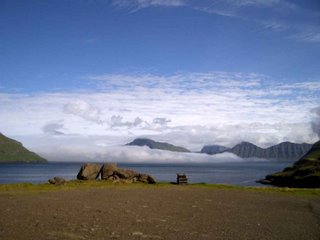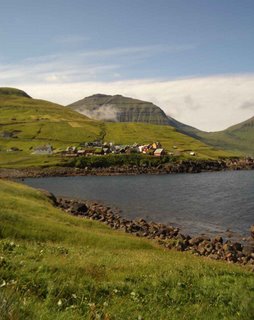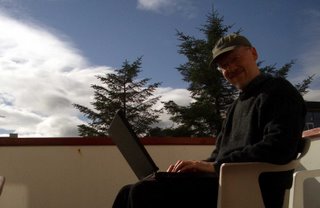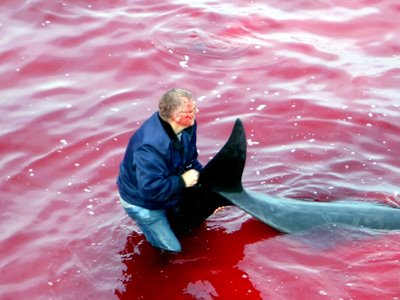
Got an email around lunch time yesterday: there is a grind ('i' as in 'tin', meaning a flock of pilot whales) right outside Torshavn, where I am staying. The mail was sent to everyone at the job, so we discussed whether it could be a hoax. After all it was so foggy outside, that you could just as well have said that a flying saucer had landed in the parking lot. I decided to take a chance on this one: after all it has been maybe 15 years since I saw a whale-killing.
There were a few people on the beach. The mood was one of relaxation and attention. Men in rubber boots, long knives, specially crafted hooks and rope. Children playing on the beach, a lot of whom had left school half-way through the day, knowing that they would be forgiven: after all, a whale-killing is considered an important event. Every now and then a boat was leaving the harbour, occasionally one returned as well. Everyone casting glances in the direction of the horizon. Or rather where they thought the horizon ought to be. It was very foggy!
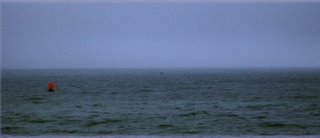
After an hour I decided to take a break from my perfect watch-post and tried to locate some known face in the crowd. Found an old school-mate that was leaving the area. He's a great pianist and I asked him give me a lesson: I've thought for a while that I needed some input to advance my forays into Bach's keyboard music. He told me that the grind was kind of stuck a bit north of Torshavn. It had a tendency to dive, so the boats had difficulty driving it anywhere. I decided to go and have a look. The fog was lifting, so I might get a good view.
When I came to Hoyvik, I saw it. Or rather, I saw the 50-100 boats surrounding the grind. A lot of cars were parked like mine along the normally desolate country road. All on the same business as myself. Some with binoculars. Everyone cursing the fog. After a short while, it seemed like the boats were moving southwards. Instantly, the roadside was deserted again.
I drove home - a bit too fast, I must admit - to see if my family was there and would like to be part of the event. Two minutes later, we had put some warm clothes and headed towards Sandageri, the beach south of Torshavn where they normally try to drive the grinds in. My wife, my son and I.
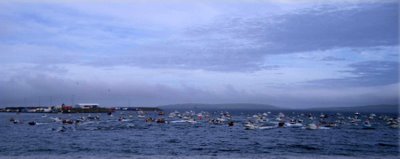
Now the place was crowded! And the boats were coming in, filling up most of the horizon. We just made it! The crowd, now counting hundreds of people, was withdrawing from the beach and forming a line of quiet menace some 50 metres up the hill.
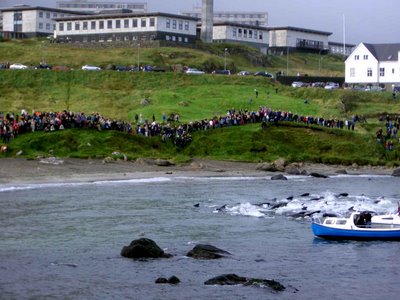
Now the goal is not to disturb the whales. From the landside. From the seaside, the men in the boats are making as much noise as they can, shouting and revving the boat engines in order to drive the flock of whales forward. They don't show of much, the whales: a few black bodies jumping up from time to time right in front of the boats. I've been told that for each whale that you can see in the surface, there are nine below. Do the counting yourself in the next photo!
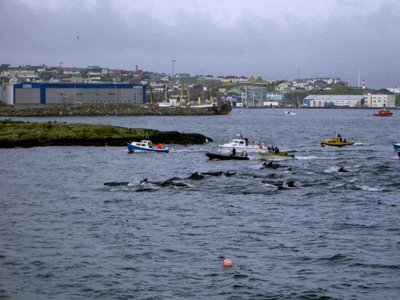
When everything is successful, the grind advances with great speed onto the beach, making the killing swift and easy. Often, however, the land crowd is to eager and starts to run to the beach too early. This is what happened now, and the whales were scared and tried to turn around.
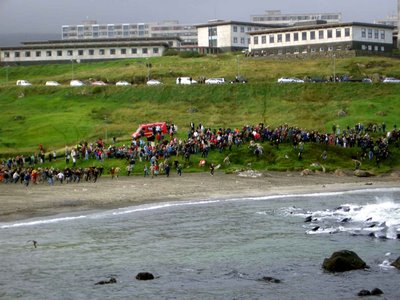
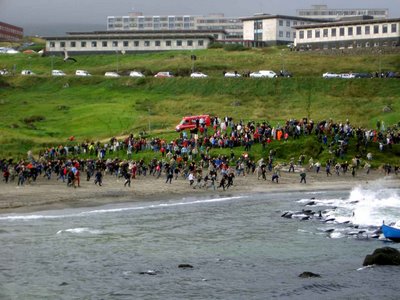
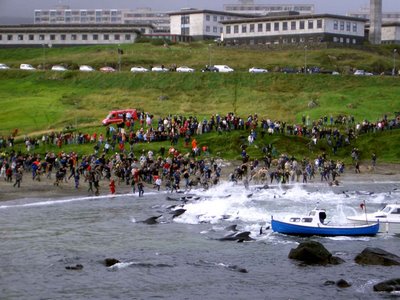
Of course, it was too late to escape, but on the other hand it meant more work with dragging them ashore. This is what the hooks and ropes are for.
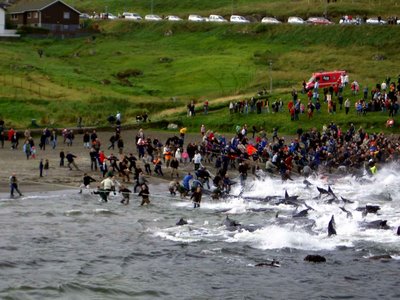
When the whales are under control on the beach, they have their throat cut. It takes less than half a minute. After about 5 minutes, the bulk of whales were dead, leaving a few stray individuals that needed to be taken care of specifically. The official sources said that the killing took 10 minutes. I would add a couple of minutes to that, but no more.
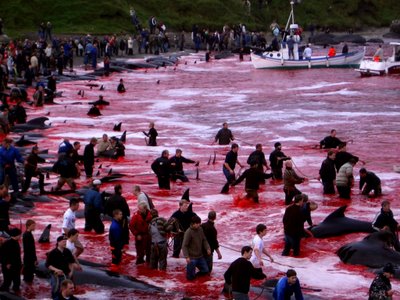
During these minutes, the sea changes colour to red: there is a lot of blood in a whale! Nice background for photographs. I go hunting for a motive to frame in with some nice red background. The kids are gathering courage and climb on top of the dead whales. Some boats have started pulling out the dead whales. They are brought to a place where it is easier to cut them up. Participants are queuing for registration, so that they eventually can get their share of the meat and fat from the whales.
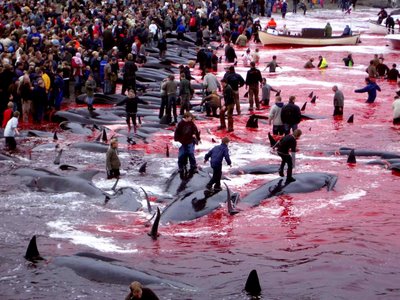
At home my daughter is frustrated over missing out the event. I promise to take her to see the dead whales. When we arrive, they are pulling the whales out of the water and organizing them on a pier.
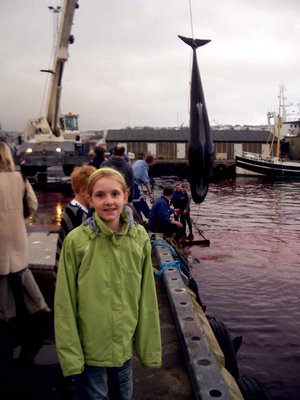
Officials are measuring and numbering the whales. Each whale gets an Arabic identification number cut into the cheek and a roman number on the wing, stating an estimate of the amount of the meat and fat in 'sjinn', where one sjinn is 50 kg meat + 25 kg fat. We see whales ranging from 1 to 22 - or rather I to XXII - sjinn.
When all the whales are numbered and measured, the officials retreat to do the complicated calculations and distribution of the participants' shares. This results in the 'notes', one for each participant, divided into those on the beach, those in the boats, the boats themselves get a portion as well. A special share is the finder's whale: the person who first saw - and announced - the grind, gets a whale for himself. Non-participants can sign up for a portion as well, but I don't think they get anything unless the grind is big enough, as in this case: there were killed 178 whales, comprising a total of 1591 sjinn, divided into 2124 parts. That gives roughly 50 kg meat and fat to each. Actually quite a bit of food.
The notes were handed out at 2 A.M.. The mayor - dressed in a sweater like the crowd, not his normal black suit, this was noted - read the names of participants aloud and handed out the notes. The only jokes that outshone those about Santa Claus where the ones starring God in a Faroese sweater.
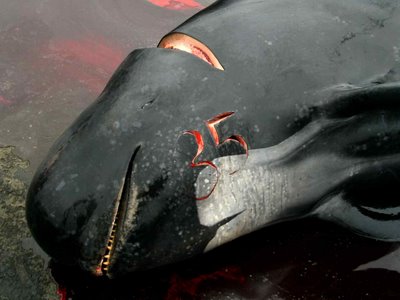
Immediately after receiving the notes, the men went out on the pier to locate their whale. For a 10 sjinn whale, there would be 17 parts. The cutting up and sharing of that whale would be up to that group. Some were more civilized than others in that process - alcohol was in some cases a influencing factor.
I went by the pier in the morning on my way to work. Everything was cut up. Only a couple of persons were still cutting some for themselves. Trucks were carrying away the remains: heads, skeletons, intestines and tails. The show was coming to an end.
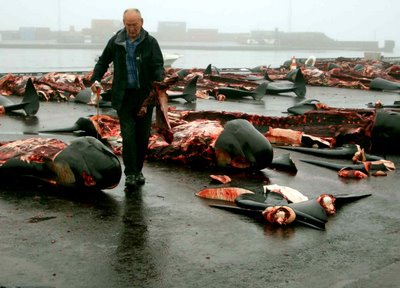
So, what to think about all this? Pity for the whales? Sure, as you would pity any other animal that you kill for eating. Contempt or rejection? Only a vegetarian can defend such an attitude. The idea that you must not kill wild animals? If you are a carnivore but still care about the well-being of animals, you cannot meaningfully take the logical consequence and state that "you may only kill and eat animals that have been imprisoned all their lives". The 178 pilot whales that were killed yesterday all had had a life in freedom and had suffered from no man-inflicted pain until the last minutes of their lives. I'd rather be sorry the next time I eat pork chops than tonight when my sister served me the first meal from yesterdays grind.
I think the reason that many people react against Faroese whale-killing is largely emotional. First of all, there is a lot of blood, and that makes us uneasy, including me. The fact that it takes place in the open - there are hundreds of cameras like mine in play each time there is a whale-killing. Then there is the legitimate concern arising from the fact that some kinds of whale have been threatened with extinction - the only thing is that few whale species are endangered today and the pilot whale never was. And finally the humanizing of whales in films such as Free Willy and the popularity of dolphin shows. Many people think that whales - and in particular dolphins - are intelligent beings, maybe even more intelligent than people. New research shows that species like mice and many birds are able to respond more intelligently and creatively to stimuli in their environment.















